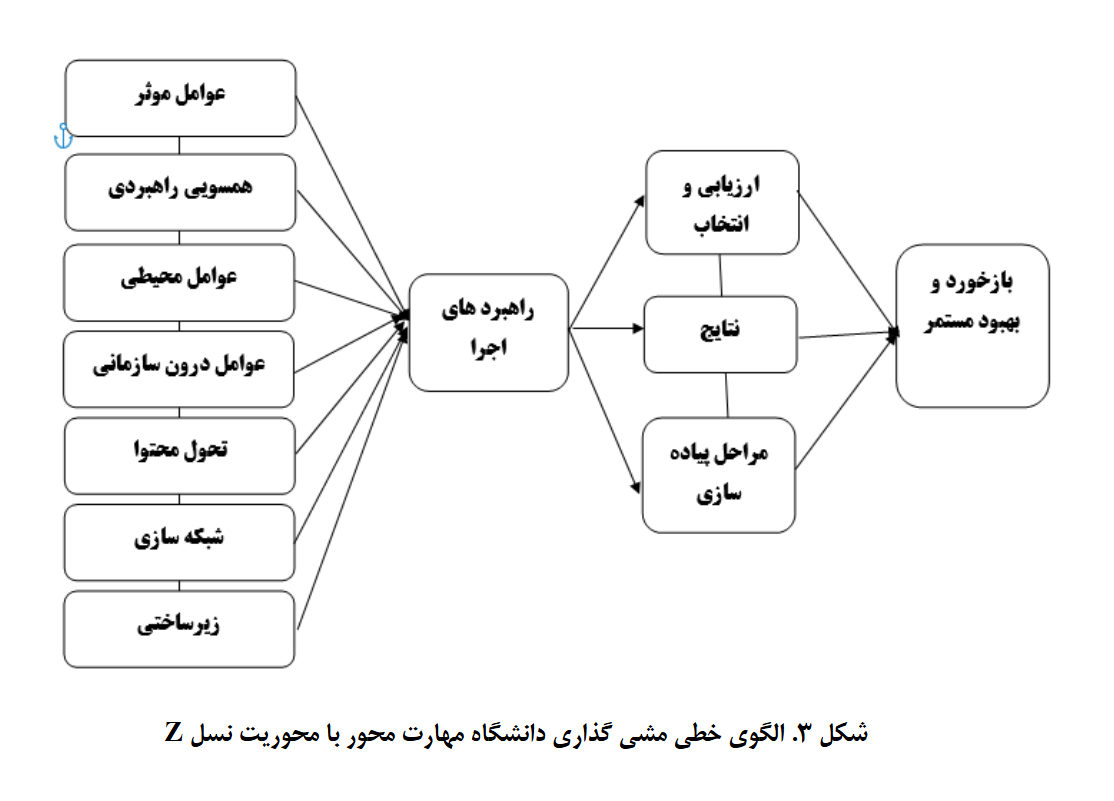A Policy-Making Model for Skill-Oriented Universities with a Generation Z Approach
Keywords:
Policy making, Skill-based university, Generation ZAbstract
The primary objective of this study was to present a policy-making model for skill-oriented universities with a Generation Z approach. A quantitative, applied, and survey-based methodology was employed to conduct this research. The statistical population consisted of all staff members, managers, and deputies of public and private universities in Tehran. The sample size was determined to be 386 individuals based on Morgan's table. Data collection was carried out using a researcher-developed questionnaire. The validity of the questionnaire was evaluated and confirmed through construct validity, while its reliability was assessed using Cronbach's alpha coefficient. Finally, structural equation modeling was applied to test the model. The AMOS software was utilized for this section of the analysis. The findings of the study identified the components of the policy-making model for skill-oriented universities with a Generation Z approach.
Downloads
References
DeMark S, Kozyrev J. Enabling pathways to opportunity through a skills‐based architecture. The Journal of
Competency‐Based Education. 2021;6(1):e1241. doi: 10.1002/cbe2.1241.
Rudolph J. Higher Education’s Generative Artificial Intelligence Paradox: The Meaning of Chatbot Mania. Journal of
University Teaching and Learning Practice. 2024;21(06). doi: 10.53761/54fs5e77.
Sitorus J, Ritonga AH, Yamin M. Integrated Quality Management of The State Islamic University of North Sumatra,
Medan in The Development of Graduation Skills Based on Soft Skills. International Journal of Progressive Sciences and
Technologies (IJPSAT). 2021. doi: 10.52155/ijpsat.v25.1.2792.
Ali Ghorbani M, Zolfaghari R, Imani MN. Identifying Dimensions and Components of Innovative Teaching Methods
in Higher Education. Sociology of Education. 2024;10(1):355-65. doi: 10.22034/ijes.2024.559157.1340.
Williams RT. The Ethical Implications of Using Generative Chatbots in Higher Education. Frontiers in Education.
;8. doi: 10.3389/feduc.2023.1331607.
Shtaltovna Y, Muzzu C, editors. Enhancing students' digital competencies within the Employability module of the
University of Europe's skills-based curricula. Proceedings of the first GiLE4Youth International Conference: The Development
of Competencies for Employability; 2021.
Hadizadeh M, Khosravi A, Assareh A, Norouzzadeh R. Role of competency-based curriculum in employability of
graduates from skills based universities (case study: university of applied sciences). Educational Administration Research.
;11(44):103-28.
Niazaazari S, Shoolehkar ES, Behrang. Investigating the Role of Information Technology in Developing SkillOriented Training in the Technical and Vocational Training Organization of Golestan Province. Quarterly Journal of
Information and Communication Technology in Educational Sciences. 2013;3(2, Serial No. 10):69-84.
Keshtkaran A, Heidari A, Bastani P. Study of managers' communication skills based on the staff's view in Shiraz
University of Medical Sciences. 2012.
Rybnicek R, Königsgruber R. What makes industry-university collaboration succeeds? A systematic review of the
literature. Journal of Business Economics. 2019;89(2):221-50. doi: 10.1007/s11573-018-0916-6.
Portuguez Castro M, Gómez Zermeño MG. Identifying entrepreneurial interest and skills among university students.
Sustainability. 2021;13(13):6995. doi: 10.3390/su13136995.
Purwanto A. Effect of hard skills, soft skills, organizational learning and innovation capability on Islamic University
lecturers' performance. Systematic Reviews in Pharmacy. 2020.
Gambrill E, Gibbs L. Critical thinking for helping professionals: A skills-based workbook: Oxford University Press;
Jahangiri-Fard S, Shafizadeh H, Soleimani N. Promoting Spiritual Health in the Fourth Generation University. Journal
of Pizhūhish dar dīn va Salāmat (ie, Research on Religion & Health). 2021;7(3):92-110. doi: 10.22037/jrrh.v7i3.34965.
Osarenren-Osaghae RI, Irabor QO. Availability and adequacy of human and material resources for the teaching and
learning of skill-based courses in Nigeria public universities. Journal of Sociology and Social Anthropology. 2012;3(1):15-27.
doi: 10.31901/24566764.2012/03.01.03.
Reichert S. The role of universities in regional innovation ecosystems. 2019.
Shariati F, Niazazari K, Jabbary N. Presenting a Model for Virtual Education Considering Educational Equity with a
Phenomenological Approach in Schools of Golestan Province. Iranian Journal of Educational Sociology. 2024;7(1):66-78. doi:
61838/kman.ijes.7.1.7.
Qazi MA, Sharif MA, Akhlaq A. Barriers and facilitators to adoption of e-learning in higher education institutions of
Pakistan during COVID-19: perspectives from an emerging economy. Journal of Science and Technology Policy Management.
;15(1):31-52. doi: 10.1108/JSTPM-01-2022-0002.
Parsakia K, Rostami M, Darbani SA, Saadati N, Navabinejad S. Explanation of the concept of generation disjunction
in studying generation z. Journal of Adolescent and Youth Psychological Studies (JAYPS). 2023;4(2):136-42. doi:
61838/kman.jayps.4.2.15.
Kamarianos I, Adamopoulou A, Lambropoulos H, Stamelos G. TOWARDS AN UNDERSTANDING OF
UNIVERSITY STUDENTS’ RESPONSE IN TIMES OF PANDEMIC CRISIS (COVID-19). 2020. 2020;7(7). Epub 2020-06-
doi: 10.46827/ejes.v7i7.3149.
Rohmiyati Y, Irhandayaningsih A. The role of mothers in media literacy assistance to digital native children in coastal
region in developing national character. Advanced Science Letters. 2018;24(12):9884-5. doi: 10.1166/asl.2018.13170.
Pocol CB, Marinescu V, Dabija DC, Amuza A. Clustering Generation Z university students based on daily fruit and
vegetable consumption: Empirical research in an emerging market. British Food Journal. 2021;123(8):2705-27. doi:
1108/BFJ-10-2020-0900.
Cilliers EJ. The challenge of teaching generation Z. PEOPLE International Journal of Social Sciences. 2017. doi:
20319/pijss.2017.31.188198.
Ozkan M, Solmaz B. The changing face of the employees-generation Z and their perceptions of work (a study applied
to university students). Procedia Economics and Finance. 2015;26:476-83. doi: 10.1016/S2212-5671(15)00876-X.
Nicholas AJ. Preferred learning methods of generation Z. 2020.
Philippas ND, Avdoulas C. Financial literacy and financial well-being among Generation-Z university students:
Evidence from Greece. Financial Literacy and Responsible Finance in the FinTech Era2021. p. 64-85.
Giray L. Meet the centennials: Understanding the generation Z students. International Journal of Sociologies and
Anthropologies Science Reviews. 2022;2(4):9-18.

Downloads
Published
Submitted
Revised
Accepted
Issue
Section
License
Copyright (c) 2024 Journal of Study and Innovation in Education and Development

This work is licensed under a Creative Commons Attribution-NonCommercial 4.0 International License.










